A.R. Moxon's Blog, page 2
October 10, 2020
Streets: Part I - HERE
 < Back | Forward >
< Back | Forward >
So: he’s a liar.
So: he’s a fascist.
So: he’s an authoritarian.
So, he’s using his office to enrich the businesses he still owns and from which he still profits.
So, he encourages and celebrates police violence, and advocates the use of military force against peaceful protest.
So, he’s using the exact language and phrases of white supremacy and neo-Nazis and fascism, pursuing their exact desired policies.
So: he’s deliberately demolishing all norms and standards of a functional democracy, in service of demolishing democracy, in service of himself.
So: he’s working to put himself entirely above the law, and, even more, positioning himself as the law, as someone whose authority must not be questioned, to whom loyalty is irreducible from patriotism, for whom criticism must be understood as not just criticism of the country but as an attack on it.
So, he used the power of his office transactionally, first to try to destabilize the coming elections, then to try to punish political enemies by imposing medical sanctions on his own citizens during a pandemic; premeditated manslaughter at best, genocide at worst.
And: His entire party has rallied around these efforts, in support of them, almost as if somebody doing what he is doing was the plan all along.
And: His followers, his true believers, millions and millions strong, all cheer for him, and the worse he gets, the more that he perfectly embodies all of the worst things any of us warned he might become, the more they seem to love him. They cheer and cheer and cheer, and they tell us to get over it, and they say “fuck your feelings,” and then they tell us they love the way he makes us weep, because they love to drink our tears. And they take to the streets and government buildings with guns to win back their never-lost right to honor murderous soldiers who fought to preserve chattel slavery, or to establish their right to spread a virus to the satisfaction of their own convenience. And they laugh and laugh and cheer and cheer and yet they never seem to get happy.
They cheer for a system that is optimized for the abuse of the marginalized by the powerful, not because they are powerful, but because seeing the abuse of the marginalized comforts them that they are not marginalized.
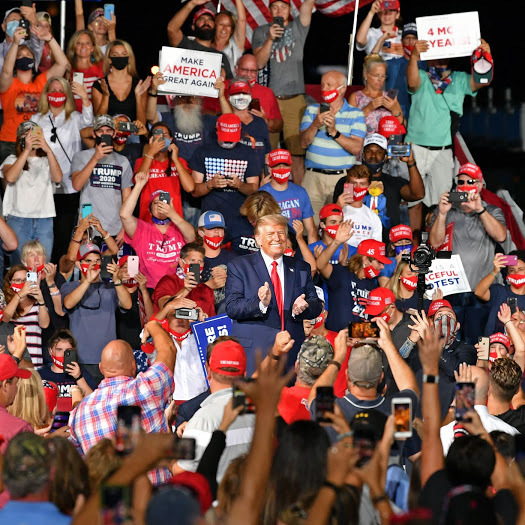
And: Comfortable masses, tens of million strong, seem not to worry about any of this, as long as it doesn’t touch them personally; seem willing to overlook any outrage to any other person, seem capable of finding any handy excuse in any given moment to separate themselves from the inconvenience of caring.
If you think all the quite obvious truths listed above seem hysterical, overwrought, scolding, divisive … then you speak the language of the comfortable masses, for whom the report of abuse is seen as the real abuse, who resent the screams of the victims far more than the screams of their attackers, because the screams of the victims seem to dare expect some sort of moral response, while the screams of the attacker ask only for complicit silence, which is the preferred posture.
They keep silent in a system that rewards comfortable enablement of abuse of the marginalized by the powerful, not because they love abuse, but because they love comfort and reward.
There are others of us, who have conformed enough to the needs of a country that consumes people that we’ve been kept relatively comfortable; who are now, in this rough authoritarian age, coming to these inescapable realizations, which are new only to us. The tumor at last distends the belly, and now we know.
And there are those of us for whom this is no revelation, because for these—not white enough, wealthy enough, male enough, abled enough, cis enough, straight enough—this has always been the country they’ve known.
So. Here we are.
And the question is: what next?
Next? Well, either he wins, or he loses.
Either he gets what he wants, and his party get what they want, and his cheering hordes get what they want, or else they don’t.
If he wins, it’s a grim matter but at least it’s a simple matter. We have enough of a trendline to see exactly where we’re headed. We’ll see the full-throttle victory of all our old worst historical traditions and the death of all our best aspirational dreams for ourselves. We’ll see the final death gasps of whatever shreds remain of our tattered global reputation, and the irrevocable end of our oldest alliances. We’ll fully commit to being an authoritarian kleptocracy, a theocratic genocidal white ethno-state, which exists to line the pockets of the very wealthy and to profit off the bodies of the rest—who are controlled for as long as they’re useful, then discarded when they aren’t. There will be some semblance of something they’ll call “elections.” There will be some semblance of something they’ll call “the news.” There will be troops whose ostensible purpose is to protect our borders, ranging far from the border, and others whose ostensible purpose is to protect our citizens, occupying our neighborhoods; all of them acting as they see fit to create the sort of general and specific terrors that comprise their only true mission. There will be locations that will be called something less overt than “concentration camps”—indeed, there already are such locations, but there will be more of them, and they will grow more efficient, and more secret.
There will be many who will die because they’ll no longer have what’s needed to survive in a country that has been architected in such a way to digest and destroy unprofitable people. In such a country, all one has to do if they want to kill masses of people is arrange things so the people you want dead can no longer be profitable.
Yes, that’s what they’ll do.

If not, why are they already doing it as much as they’re able? If not, why are they already doing it more and more, the more and more they find they’re allowed? It’s not comfortable to know, but those not knowing it reveal a willful effort to not know obvious things.
And if we win? If he and his party lose? If we actually manage to halt their advance?
Well. If he loses, then a somewhat more hopeful matter, but not so simple. Because we’ve learned things about ourselves, and our country, and our friends and neighbors, and our systems of administration and authority, that we can never un-know.
We now know who will look the other way, and what they’ll look the other way for. We know who will find reasons to accept unacceptable things, or become confused about obvious truth and obvious lie. We know now what people will stand for. We know now what people will cheer for. When the chips are down, you find out what people are like when the chips are down. And then you know.
We’ve watched the message of an openly fascist, openly corrupt, openly white supremacist president grow, and spread, a new strain of an old virus, against which we’d stopped being vigilant; optimized for a world of international television and internet media, a sensationalized version of our country’s oldest sins. We’ve heard those who would cheer this spiritual infection of hate, who would gather in red-capped throngs to spread this soul rot between each other. We’ve seen the enthusiasm of some, the eagerness, the joy, at the thought that they might once again become great; that in a nation that was listening to more and more voices, they might become the only voice; in a nation that was seeking diversity, they might once again become not just the default consideration but the only one; in a nation that was imperfectly seeking equality, that they might again become the sole priority. We’ve seen the quick acceptance of others, as they opened themselves to this new infection of old lies, seeking some advantage they might press, as more vulnerable populations first felt the effects.
We’ve heard all the excuses they give themselves for all this. And we’ve heard all the threats they’ve offered, the war they’ve promised to deliver, if they don’t get their way. We’ve seen the sunglasses hat goatee warriors on the steps of government buildings toting their private massacre weapons, and we’ve noticed that our police show them far more deference than others who present far less threat to a peaceful order, whose cause is justice rather than selfishness. We’ve seen the cops rioting, brutalizing the crowds every night with military equipment and thuggish tactics.
And they aren’t going to stop cheering for it, even if we depose their beloved hate goblin. They’re not going to stop expecting it, or demanding it, or fighting for it. They’ve seen the white supremacist authoritarian anti-democratic state that Donald Trump would bring, and they very much want it. They think it's great.
But there’s more.
We now know that, even though Trump is a disruption to the status quo in some ways, he isn’t only a disruption to the status quo. In many ways, he is a part of that status quo’s inevitable progression. He’s the result you can expect to see, in a society that believes that we have no shared society beyond individual desire, that life must be earned, that wealth is how you earn it, and that violence redeems. We can see that Trump isn’t a disruption to business as usual, but rather a pure distillation of that business.
In other words, even though he spread a virus, Trump isn’t a virus. He’s the first unignorable tumor—for those of us comfortable enough to have ignored the previous symptoms. Yes, he’ll have to be removed completely, but afterward things are going to have to be different. If they aren’t, then we’ll find ourselves here again.
We’ve heard all the excuses the more comfortable among us make for not making significant changes afterward, for going back to how it was before, to not having to think about politics anymore. Even many opposed to the spiritual virus of MAGA America aren’t interested in quarantining it. Some aren’t interested in vaccinating against it. Some don’t think it will be necessary to engage in radical transformation, to create permanent new systems and safeguards to detect and protect against new future strains. Some want only to remove the tumor of Trump, then return to the exact situation that allowed it to grow.
And we’ve heard all the justifications they give themselves for all this.
They’re not strangers, these cheering throngs, and they’re not strangers, these complacent masses. They’re the people we grew up with and live around. They’re us. They’re generous, many of them. Capable workers. Well-intentioned. Happy, smiling, friendly. They love their kids. They go to church. They work hard. They pay their taxes. They walk their dogs. They love us, some of them. Yes, and we love them, many of them—and if we seem so angry, perhaps the reason is that the anger we feel toward these friends and family and neighbors, while appropriate and honest, is easier than the deep sorrow and mourning they've inflicted on us, by so willingly, eagerly, or complacently aligning with a man who has no redeeming characteristics, who pursues atrocity, energizes hate, demolishes democracy, and promotes an empty promise of tawdry glory that's as chintzy and false and stupid as everything else about him.
We share a country with them, whether they’ll admit it or not. We share families and tribes and country and world. We are all tied together in a natural human system.
There are people who know about the virus of hate and what to defeat it, who know about the cancer of greed and want to fight it …
… and people who know about the actual virus and want to spread it, who know about actual cancer and want to profit from it …
… and people who have deliberately decided not to know, and are working very hard now to not know.
Many of them are, to quote our Glorious Leader himself, “very fine people.”
I am one who now knows things previously unknown. This is my confession of knowledge. I assume there are still many things I don’t yet know that I’ll learn, and so I assume there are many ways in which this confession will be imperfect. So: let the imperfections stand as a part of the confession.
We know things about ourselves that we hate to know, but there’s no going back. There are two questions we have to face, now that we have this knowledge. I’ll get to the second question in time. It seems likely I won’t post this question until after the election, but that’s fine, because while the election matters a great deal, it’ll mostly determine how much damage and harm and pain and theft and murder there’s going to be in the near term; it won’t determine whether there will be any, or what we have to do about it. And these questions, which sounds simple, but aren’t, will be the same after the election as it is before, no matter the result, and so will the answers.
The first question is about conviction and confession.
It’s this: How did we get here?

A.R. Moxon is a writer. His novel The Revisionaries , is available now, with the paperback edition releasing December 1, 2020.
0. NEXT
HERE
1. STREET
2. VALUE
3. CONFIGURE
4. NEIGHBOR
5. INHERIT
6. ALIGN
NOW
7. CONVICT
8. CONFESS
9. REPENT
10. REPAIR
Streets Part I - HERE
 Back
BackSo: he’s a liar.
So: he’s a fascist.
So: he’s an authoritarian.
So, he’s using his office to enrich the business he still owns and from which he still profits.
So, he encourages and celebrates police violence, and advocates the use of military forces against peaceful protest.
So, he’s using the exact language and phrases of white supremacy and neo Nazis and fascism, pursuing their exact desired policies.
So: he’s deliberately demolishing all norms and standards of a functional democracy, in service of demolishing democracy, in service of himself.
So: he’s working to put himself entirely above the law, and, even more, positioning himself as the law, as someone whose authority must not be questioned, to whom loyalty is irreducible from patriotism, for whom criticism must be understood as not just criticism of the country but as an attack on it.
So, he used the power of his office transactionally, first to try to destabilize the coming elections, then to try to punish political enemies by imposing medical sanctions on his own citizens during a pandemic; premeditated manslaughter at best, genocide at worst.
And: His entire party has rallied around these efforts, in support of them, almost as if somebody doing what he is doing was the plan all along.
And: His followers, his true believers, millions and millions strong, all cheer for him, and the worse he gets, the more he perfectly embodies all of the worst things any of us warned he might become, the more they seem to love him. They cheer and cheer and cheer, and they tell us to get over it, and they say “fuck your feelings,” and then they tell us they love the way he makes us weep, because they love to drink our tears. And they take to the streets and government buildings with guns to win back their never-lost right to honor murderous soldiers who fought to preserve chattel slavery, or to establish their right to spread a virus to the satisfaction of their own convenience. And they laugh and laugh and cheer and cheer and yet they never seem to get happy.
They cheer for a system that is optimized for the abuse of the marginalized by the powerful, not because they are powerful, but because seeing the abuse of the marginalized comforts them that they are not marginalized.

And: Comfortable masses, tens of million strong, seem not to worry about any of this, as long as it doesn’t touch them personally; seem willing to overlook any outrage to any other person, seem capable of finding any handy excuse in any given moment to separate themselves from the inconvenience of caring.
If you think all the quite obvious truths listed above seem hysterical, overwrought, scolding, divisive … then you speak the language of the comfortable masses, for whom the report of abuse is seen as the real abuse, who resent the screams of the victims far more than the screams of their attackers, because the screams of the victims seem to dare expect some sort of moral response, while the screams of the attack ask only for complicit silence, which is the preferred posture.
They keep silent in a system that rewards comfortable enablement of abuse of the marginalized by the powerful, not because they love abuse, but because they love comfort and reward.
There are others of us, who have conformed enough to the needs of a country that consumes people that we’ve been kept relatively comfortable; who are now, in this rough authoritarian age, coming to these inescapable realizations, which are new only to us. The tumor at last distends the belly, and now we know.
And there are those of us for whom this is no revelation, because for these—not white enough, wealthy enough, male enough, abled enough, cis enough, straight enough—this has always been the country they’ve known.
So. Here we are.
And the question is: what next?
Next? Well, either he wins, or he loses.
Either he gets what he wants, and his party get what they want, and his cheering hordes get what they want, or else they don’t.
If he wins, it’s a grim matter but at least it’s a simple matter. We have enough of a trendline to see exactly where we’re headed. We’ll see the full-throttle victory of all our old worst historical traditions and the death of all our best aspirational dreams for ourselves. We’ll see the final death gasps of whatever shreds remain of our tattered global reputation, and the irrevocable end of our oldest alliances. We’ll fully commit to being an authoritarian kleptocracy, a theocratic genocidal white ethno-state, which exists to line the pockets of the very wealthy and to profit off the bodies of the rest—who are controlled for as long as they’re useful, then discarded when they aren’t. There will be some semblance of something they’ll call “elections.” There will be some semblance of something they’ll call “the news.” There will be troops whose ostensible purpose is to protect our borders, ranging far from the border, and others whose ostensible purpose is to protect our citizens, occupying our neighborhoods; all of them acting as they see fit to create the sort of general and specific terrors that comprise their only true mission. There will be locations that will be called something less overt than “concentration camps”—indeed, there already are such locations, but there will be more of them, and they will grow more efficient, and more secret.
There will be many who will die because they’ll no longer have what’s needed to survive in a country that has been architected in such a way to digest and destroy unprofitable people. In such a country, all one has to do if they want to kill masses of people is arrange things so the people you want dead can no longer be profitable.
Yes, that’s what they’ll do.

If not, why are they already doing it as much as they’re able? If not, why are they already doing it more and more, the more and more they find they’re allowed? It’s not comfortable to know, but those not knowing it reveal a willful effort to not know obvious things.
And if we win? If he and his party loses? If we actually manage to halt their advance?
Well. If he loses, then a somewhat more hopeful matter, but not so simple. Because we’ve learned things about ourselves, and our country, and our friends and neighbors, and our systems of administration and authority, that we can never un-know.
We now know who will look the other way, and what they’ll look the other way for. We know who will find reasons to accept unacceptable things, or become confused about obvious truth and obvious lie. We know now what people will stand for. We know now what people will cheer for. When the chips are down, you find out what people are like when the chips are down. And then you know.
We’ve watched the message of an openly fascist, openly corrupt, openly white supremacist president grow, and spread, a new strain of an old virus, against which we’d stopped being vigilant; optimized for a world of international television and internet media, a sensationalized version of our country’s oldest sins. We’ve heard those who would cheer this spiritual infection of hate, who would gather in red-capped throngs to spread this soul rot between each other. We’ve seen the enthusiasm of some, the eagerness, the joy, at the thought that they might once again become great; in a nation that was listening to more and more voices, the only voice; in a nation that was seeking diversity, the default; in a nation that was imperfectly seeking equality, the sole priority. We’ve seen the quick acceptance of others, as they opened themselves to this new infection of old lies, seeking some advantage they might press as more vulnerable populations first felt the effects.
We’ve heard all the excuses they give themselves for all this. And we’ve heard all the threats they’ve offered, the war they’ve promised to deliver, if they don’t get their way. We’ve seen the sunglasses hat goatee warriors on the steps of government buildings toting their private massacre weapons, and we’ve noticed that our police show them far more deference than others who present far less threat to a peaceful order, whose cause is justice rather than selfishness. We’ve seen the cops rioting, brutalizing the crowds every night with military equipment and thuggish tactics.
And they aren’t going to stop cheering for it, even if we depose their beloved hate goblin. They’re not going to stop expecting it, or demanding it, or fighting for it. They’ve seen the white supremacist authoritarian anti-democratic state that Donald Trump would bring, and they very much want it. They think it's great.
But there’s more.
We now know that, even though Trump is a disruption to the status quo in some ways, he isn’t only a disruption to the status quo. In many ways, he is a part of that status quo’s inevitable progression. He’s the result you can expect to see, in a society that believes that we have no shared society beyond individual desire, that life must be earned, that wealth is how you earn it, and that violence redeems. We can see that Trump isn’t a disruption to business as usual, but rather a pure distillation of that business.
In other words, even though he spread a virus, Trump isn’t a virus. He’s the first unignorable tumor—for those of us comfortable enough to have ignored the previous symptoms. Yes, he’ll have to be removed completely, but afterward things are going to have to be different. If they aren’t, then we’ll find ourselves here again.
We’ve heard all the excuses the more comfortable among us make for not making significant changes afterward, for going back to how it was before, to not having to think about politics anymore. Even many opposed to the spiritual virus of MAGA America aren’t interested in quarantining it. Some aren’t interested in vaccinating against it. Some don’t think it will be necessary to engage in radical transformation, to create permanent new systems and safeguards to detect and protect against new future strains. Some want only to remove the tumor of Trump, then return to the exact situation that allowed it to grow.
And we’ve heard all the justifications they give themselves for all this.
They’re not strangers, these cheering throngs, and they’re not strangers, these complacent masses. They’re the people we grew up with and live around. They’re us. They’re generous, many of them. Capable workers. Well-intentioned. Happy, smiling, friendly. They love their kids. They go to church. They work hard. They pay their taxes. They walk their dogs. They love us, some of them. Yes, and we love them, many of them—and if we seem so angry, perhaps the reason is that the anger we feel toward these friends and family and neighbors, while appropriate and honest, is easier than the deep sorrow and mourning they've inflicted on us, by so willingly, eagerly, or complacently aligning with a man who has no redeeming characteristics, who pursues atrocity, energizes hate, demolishes democracy, and promotes an empty promise of tawdry glory that's as chintzy and false and stupid as everything else about him.
We share a country with them, whether they’ll admit it or not. We share families and tribes and country and world. We are all tied together in a natural human system.
There are people who know about the virus of hate and what to defeat it, who know about the cancer of greed and want to fight it …
… and people who know about the actual virus and want to spread it, who know about actual cancer and want to profit from it …
… and people who have deliberately decided not to know, and are working very hard now to not know.
Many of them are, to quote our Glorious Leader himself, “very fine people.”
I am one who now knows things previously unknown. This is my confession of knowledge. I assume there are still many things I don’t yet know that I’ll learn, and so I assume there are many ways in which this confession will be imperfect. So: let the imperfections stand as a part of the confession.
We know things about ourselves that we hate to know, but there’s no going back. There are two questions we have to face, now that we have this knowledge. I’ll get to the second question in time. It seems likely I won’t post this question until after the election, but that’s fine, because while the election matters a great deal, it’ll mostly determine how much damage and harm and pain and theft and murder there’s going to be in the near term; it won’t determine whether there will be any, or what we have to do about it. And these questions, which sounds simple, but aren’t, will be the same after the election as it is before, no matter the result, and so will the answers.
The first question is about conviction and confession.
It’s this: How did we get here?

A.R. Moxon is a writer. His novel The Revisionaries , is available now, with the paperback edition releasing December 1, 2020.
0. NEXT
HERE
1. STREET
2. VALUE
3. CONFIGURE
4. NEIGHBOR
5. INHERIT
6. ALIGN
NOW
7. CONVICT
8. CONFESS
9. REPENT
10. REPAIR
October 9, 2020
Streets 0 - Next
This is not the explanation of an expert. This is the confession of a fool.
In the months after the 2016 election, while still reeling from the permanent demolition of the reality I'd known, and the betrayal of every fine principle I’d thought our nation shared—by institutions and people I’d thought trustworthy, into open white supremacy and authoritarianism—I wrote an essay called Sky. It was my lament.
Near the end of the first year, I posted Bubbles. It’s a series of essays about a nation I’d failed to see, and the terrible lies I saw it has been founded upon, the spiritual desire of such terrible lies, and what I perceived as our role in that world, which is to live as good stories, as works of art.
I learned what they were about by writing them, and then thinking about them after.
Here, then, is the next one.
It’s the thing that comes at the end of my four-year revelation of American menace and cruelty. I’m calling it "Streets." I don’t know what it’s about yet, other than that—like those that came before—it’s about where I’ve arrived, and how we got here, and where I think we should go from here, if we're interested in survival as a nation and a species—an open question, I realize.
The things I’ll be saying are things I’ve learned recently, but they aren’t things recently true. Only my awareness is new—and yours, maybe. There are others who’ve known all these things, and more besides, for a long time. How long? Their whole lives. They’ve been telling us about it all along, and we haven’t heard until recently.
We? I. I haven’t heard until recently.
Heard? Listened.
I have to conclude we haven’t wanted to know.
We? I.
If you’re one who has been wise to these matters your whole life, I hope my words honor your experiences, and I apologize for all the ways they will fail.
If you’re a fool like me, still reeling even four years later from new knowledge of old truths long known, this is for you. I’m hoping to put words to how my frame has moved over four years—about what is broken, and how healing could occur.
Three years ago, I wrote that you don’t move people’s frame through argument or debate, but by telling stories.
I still believe that.
Let me tell you two stories; Here, and Now.
___Here: let’s pretend, for the sake of argument, that there's a virus. Let’s pretend it’s deadly. Let’s say it’s a novel new strain of an old structure that we’ve known about for a long time. In this story, the virus appears quickly, and it spreads quickly, rapidly becoming a global pandemic. It harms a lot of people, and many of those it harms it kills. In some places, people are better prepared for a virus, and less people get infected, and less people die as a result. In other places, people are worse prepared for a virus, and more people get infected, and more people die as a result.
Now, imagine that one reason this virus spreads so effectively is because a large number of people who get it—perhaps even a majority of the people who get it—are asymptomatic. Unaffected, they transmit it freely. They aren’t in danger themselves, but they’ll put other people in danger, simply by walking around. Some people will be harmed, and some will suffer permanent damage, and some will die, because of these asymptomatic super-spreaders, who will never even need to know that they were the cause of all this needless pain.
Now, let’s pretend it's discovered that the best way of containing such a virus is for everybody to agree, for the sake of those who are most vulnerable, to do some things that are inconvenient. Let’s make up some random examples … let’s say … they’d need to wear something on their face that is very slightly uncomfortable, and to keep to their houses as much as possible, and to avoid travel and social contact, and perhaps to spread out during necessary human interactions, for a few months. And, let's say that the best way of defeating such a virus was for governments to invest heavily on meaningful and sustained financial relief for people whose livelihoods depended on engaging in newly risky behavior, and also on a vigorous, nationally coordinated testing and tracing regime led by expert epidemiologists—in short, on knowing as much as possible about the virus, and then on spending what it costs to combat it.
We might dare hope that in time the virus in our story would be defeated. That, provided the virus is not too deadly and efficient, enough people would eventually survive the virus to produce antibodies making themselves immune, or a vaccine would be developed, and then this virus would no longer harm and kill people when it infected them. The virus would then seem, for all intents and purposes, to be gone—but it wouldn't be gone, of course. Viruses mutate, grow, change, and eventually evolve to new strains. So, any society that was wise and knowledgeable about viruses would invest in vigilant prophylactic systems to monitor and guard against outbreaks—in short, they would commit to knowing as much as possible about viruses in general, and then on spending what it costs to contain them.
Let's pretend that, in our story, most countries decide to do exactly this. But, in our story, there's one country who, though they have more resources than any other, decides instead to ignore the virus.

Can you imagine this? A society containing millions of people who absolutely refuse to participate in the minor discomforts needed to contain the virus, who oppose on the basis of cost all government intervention that would relieve those suffering very real distress because of the virus, framing their decision along lines of personal individual risk and intention and freedom; millions of people who deliberately fail to understand that they might be spreading the virus, who cite only statistics to support their contentions and ignore all others; who demand proofs of things already known and then refuse the proofs when they are given; who verbally (sometimes even physically) attack any who ask them to honor minimal levels of public health and social consideration. Pretend these people decide to be confused about all reports about the virus’s spread. Imagine many of them even choose to believe rumors that the virus is a hoax. Pretend such people become very angry when they see other people engaging in the minor inconveniences that would contain the virus—almost as if the sight of people exercising knowledge about the problem convicts them of their decision to align with ignorance.
And: let's pretend that in this society there exists a well-funded corporate media infrastructure fully committed to validating the choices of these deliberately ignorant people, and increasing their ignorance by broadcasting further disinformation, false equivalencies, and outright lies. Imagine such an apparatus, wearing the trappings of authority and trustworthiness, but aligned to delivering to their viewers reinforcements of their ignorance, fully dedicated to confessing that ignorance as wisdom, to urging their audiences toward increasingly extreme and aggressive acts in defense of that ignorance.
Before long you might decide that such a society was committed, as a first priority, to ignorance of things already known, in order to satisfy the temporary indulgence of their own convenience.
Before long you might even have to conclude such people have alignedthemselves with the spread of the virus, no matter their stated intents.
In our story, these people don't align themselves with the spread of the virus by actively spreading it. They align themselves with it by simply refusing to know things that are already known, because they don’t want to accept the responsibility that comes with knowledge, because they are intent on avoiding any inconvenience that might come with that responsibility.

Or: Imagine a government that decides only to fight the virus to the extent that corporate profit is protected, and, outside of those bounds, will simply exercise a practiced ignorance that the virus exists, or else claim the virus has been contained and now exists in the past, or is simply an unchangeable part of the new way of things. Imagine the leader of such a government who decides to suppress testing, because the report of infection makes him look bad, and without such report, the full truth of infection won’t be known.
Imagine a government that decides not to invest in monitoring and guarding against the next virus, or even dismantles existing apparatuses and safeguards in order to save a pittance in expenditure.
Before long, you might decide that such a government was not committed to the health of its citizens. Before long, you’d have to conclude that such a government had deliberately chosen ignorance of things already known, in order to satisfy the temporary benefit of other interests.
Before long one might even have to conclude such a government has aligned themselves with the spread of the virus, no matter their stated intents. They’d say that they are against viruses—of course they are. But any observer would know better, if they had eyes to see it.
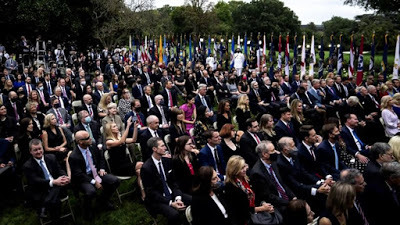
In our story, this government doesn't align themselves with the spread of the virus by actively spreading it. They align themselves with it by simply refusing to acknowledge things that are already known, because they don’t want to accept the responsibility that comes with knowledge, because they are intent on avoiding any cost that might come with that responsibility.
End of story one.
___
Before long, you’d have to understand our patient as somebody committed, as a first priority, to not knowing things that are already known, in order to try to return to a previous state that is no longer attainable.
Before long, you’d understand our patient is putting their entire body in grave danger, not because they've made a measured, aware, and purposeful decision about their being, but simply because they don't want to acknowledge the reality in which they now find themselves. Before long, you'd have to conclude that his patient is aligned with the spread of the cancer, whether or not they intend to be.
Our patient doesn't align themselves with the spread of the cancer by actively spreading it. They align themselves with it by simply deciding to not know things that are already known, and not taking active steps to oppose it.
Or: Imagine our patient exists within a healthcare system that made payment a higher priority than treatment and prevention. Imagine this healthcare system instructed doctors and hospitals to refuse to allow the tests or treatments, unless it could be first established that the patient had the ability to pay.
Imagine a healthcare system that let people die if treating them wasn't profitable. Imagine one structured so that existence of a health condition made it less likely for that person to receive health care, simply because treating an unhealthy person is more expensive than treating a healthy one.
Before long you might decide that such a system was not committed to health. Before long you’d have to conclude that such a system had deliberately chosen ignorance of things already known, in order to satisfy the temporary benefit of other interests. Before long you might even have to conclude such a system has aligned itself with cancer and every other type of disease, no matter the intents of well-meaning people within such a system. It's administrators will tell you that they are against cancers—of course they are. But you will know better, if you have eyes to see it.

This system doesn’t align itself with the spread of cancer by actively spreading it, but simply by refusing to acknowledge things that are already known, because it doesn't want to accept the responsibility that comes with knowledge, because it is intent on avoiding any cost that might come with that responsibility, and on reaping the benefits that come from the existence of the problem.
End of story two.
___It seems to me that viruses and cancers have a number of clear similarities and intersections. Both are opportunistic, both committed only to the spread of themselves. Both are systemic, in that what they consume are healthy systems, first destabilizing them, and then, if left untreated, compromising them to the point of failure.
Both, then, ought to be treated, generally speaking. Surely we all agree on that point.
In both cases, effectively treating them involves: first, knowledge that they exist; then a short-term change—often radical, often targeted, often radical, to eliminate the threat; then a remedy—a permanent, holistic, watchful, strategic, systemic restructuring—to monitor for and prevent recurrence.
In both cases, aligning against the spread requires active, persistent, determined, informed, and transformative action.
In both cases, aligning with the spread requires only passivity.
Virus and cancer: all either needs to devour a healthy system is for you do nothing—they’ll do the rest.
The differences between viruses and cancers are also instructive.
A deadly virus has no place whatsoever in a healthy system. The treatment for such a virus is to contain it, expunge it, and eradicate it. A perfectly healthy system will have no deadly viruses whatsoever. A virus spreads by mutating a new form for which a healthy system has not yet developed a defense. The remedy against a virus is complete denial: to monitor for new strains to detect them, contain them, and eliminate them.
To give a layman's understanding, a cancer typically grows when a system improperly prioritizes a part of a itself that would otherwise be healthy and natural: bone, breast, lymph, lung, liver. Treatment for a cancer is meant, hopefully, to restore the tissue to a right balance within the system, removing the cells committed to an unhealthy growth while saving the cells that the system needs. After treatment for liver cancer, for example, a recovering person will still have some part of a liver, just one hopefully free of cancer. And: though liver cancer springs from the liver, the existence of liver cancer doesn’t mean that livers in general are bad. And: a cancer frequently spreads because of environmental or lifestyle factors. The remedy for a cancer often involves testing and monitoring of the entire system, to ensure all of it is working in a way that is healthy and sustainable and fitting.
With a virus, the challenge is keeping it out of the system entirely. You defeat the viral attack on the body’s systems, then keep vigilant against the next mutation of the virus, because if you don’t, it’ll grow, and spread, infecting more and more, taxing our response systems, and making us more vulnerable, especially those of us who were vulnerable already, including those of us with … cancer.
With a cancer, the challenge itself is systemic. A tumor is often merely the most unignorable symptom of a systemic vulnerability, demanding radical changes to the configuration of body and lifestyle. In many cases, in order to preserve the body, things cannot go on as they have previously, because to return to such a state makes disaster inevitable, and failing to make radical changes compromises the entire body, making it susceptible both to recurrence of tumors and even external factors, like … viruses.
When we find our systems compromised by either cancer or virus, we should not avoid radical and transformative change, if we would align with health. We should seek radical remedy and transformational change. We should desire them as if they were survival itself—which they are.
And, if we would align against recurrence, we should never avoid a systemic restructuring, no matter the expense. We should seek it. We should desire it as if it were survival itself—which it is.
And, if we care about health, we must never refuse to know what we know about either virus or cancer.
The cost of ignorance is, eventually, everything. The cost of knowledge, however painful, can never exceed it.
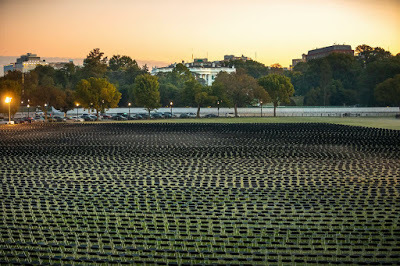 Each chair = 10 lives.
Each chair = 10 lives.___
So: it’s time to talk about the United States and the world.
These days, talking about the United States and the world means talking about the fascist white supremacist who is currently the Republican President of the United States, and who is—and I still cannot believe I am typing this—Donald Trump.
A.R. Moxon is a novelist. His novel The Revisionaries , is available now, with the paperback edition releasing December 1, 2020.
0. NEXT
HERE
1. STREET
2. VALUE
3. CONFIGURE
4. NEIGHBOR
5. INHERIT
6. ALIGN
NOW
7. KNOW
8. CONFESS
9. REPENT
10. REPAIR
February 29, 2020
Lord Of The Transcript
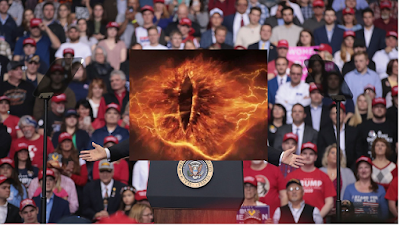
“Folks we’ve got this ring, a very great ring and some say it’s the One Ring, made by Elves, you’ve got elves and then High Elves, which is the best quality, elfwise, and they made this ring to bind them all, even in the darkness, it’s amazing, anyway I sold it to Isengard.”
“Saruman is great among the wise folks, and he’s been good, he’s said some very nice things about me, unlike low-power pathetic liar Mithrandir, a very sad person! Saruman the White!—which I like. The White. No other colors in there. The yellow eye it burns us, folks. It burns.”
“Baggins is a thief, believe me. A filthy thief. He asks me ‘what’s it got in its pockets.’ How would I know? I don’t know his pockets. I’ve never seen his pockets. A nasty hobbit, folks, and we hates him, don’t we? He stole the precious, but we’ll get it back. We’ll get it.”
“It’s very terrible what they did to Grima Wormtongue, perhaps the greatest most unfair witch hunt since the Numenorians smote Morgoth and threw him down from his fastness and the earth did tremble at his fall. The Numenorians come from over the sea, most people don’t know that.”
“We should be friends with Mordor. Mordor has very fine people, folks. Everyone’s always saying ‘oh Mordor Mordor’ —I don’t know Sauron. I’ve never met him. I’m not in thrall to his dread palintir. No thrall. No thrall. You’re the thrall. And then you have Wacky Tom Bombadil ... "
“I know ring lore like you wouldn’t believe, much that is hidden even from the wise, perhaps more even than Ilúvatar. I know that the ring is being found, perhaps as soon as next week, I have nine of the best people in the Shire, and they cannot believe what they're finding."
“We have Hobbits coming into the Riddermark, folks, and they’re awakening the tree-people, and they’re smoking the pipe-weed, and eating second breakfasts, third breakfasts, your breakfasts, your children’s breakfasts, they’re bad bad folks, and Schifty Strider, he loves ‘em.”
“We’re going to build a wall around Gondor, folks. A big white beautiful wall. And Rohan’s going to pay for it. Osgiliath didn’t have a wall—now look. Mordor has a wall. The Dark Lord has a beautiful wall."
“WHAT THE HELL IS HAPPENING IN MIRKWOOD??”
"Mithrandir, a very low-power individual, who asks questions just to feel big. I don't know the answers, OK? The ring was a birthday present, It was a birthday present, believe me, and it's mine, and I've had far bigger birthday presents before. I don't know anyone named Deagol."
"Fëanor, son of Finwë, King of the Noldor, is an example of somebody who's done an amazing job and is being recognized more and more. We all appreciate his contributions, and we're looking into him, and we're looking very strongly. Nobody was talking about him before me."
"We've got great strong people at the border, and they're doing a very tremendous job. We've got trolls, Men of Harad, orcs riding wargs, and Mûmakil—oliphaunts! We love the oliphaunts, don't we. Huge. Very impressive. Let's hear it for the Easterlings of Rhun, folks."
"It's time to FINISH THE WALL! And we're going to have spiders in the wall, and they're gonna be older than the first stone of Barad-dûr; and they'll serve none but themselves, drinking the blood. Hobbits are coming over, folks, and they simply walk into Mordor. They simply walk."
"Galadriel, a really nasty individual. A very sick woman. They call her 'lady of the woods' but she's no lady, believe me. She's said some terrible things. She keeps Nenya the ring of power, but she won't say where. If it were me, they'd gather the 7 armies, but never mind."
“I can’t believe we occupied Moria and didn’t take the mithril. When we go back, we're gonna take the mithril. Believe me, we'll take it.”
“Last time I was here, this orc came up —a big guy, very tough, like out of central casting, handsome, could’ve been a fighting Uruk-hai—and he’s crying, weeping, he says ‘sir, thank you for the meat.’ Incredible. He hadn’t had nothing but maggoty bread for three stinking days.”
"Ents. I don't even know. Ents. Very dumb people. They're looking for Entwives. Where did they go? They don't know. What did they look like? They can't say. How long ago was it? Don't know. They lost the Entwives. Boo hoo hoo and hoom hoom hoom. "IT'S A TOTAL HOAX!"
"I'll get the ring, folks, don't worry. I'll do it. I am seeking, it, seeking it. All my thought are bent on it—and I have the very best thoughts, a very high IQ individual, perhaps the best ever in terms of thought. I need only it to COVER MIDDLE AMERICA IN A SECOND DARKNESS!"
January 30, 2020
Defense
Your honor, listen:
He didn't do it.

He didn't do it so much, that we shouldn't talk to anybody who was around him at the time
And also: so what if he did it?
He can do it if he wants to, he can do whatever he wants, if you keep talking about him we'll go after you for doing it, that thing you say he did, which he didn't, but which is perfectly OK for him to do.
It's so hateful to say he did the thing he didn't do AT ALL, that thing which sworn witnesses said he did do, that thing which anybody can see he did in that truncated transcript he released, that thing which we've seen him literally do on television several times, how dare you persecute him for that thing he didn't do that you've seen him do WHICH IS FINE FOR HIM TO DO.
It's so fine to do it, so perfectly justified, so absolutely OK, that we should absolutely not hear from anybody with firsthand accounts of him doing the perfectly OK thing WHICH HE DIDN'T DO but always remember that he CAN do it and it would be GREAT if he DID do but he DIDN'T and how dare you.
Oh sure. Maybe you think he did do it and has done it a lot and is still doing it and last month we all agreed it would be really very bad if he was doing it but that was before we found out that he did do it (which he DID NOT) and now we say it's fine that he did it (he DIDN'T) but the important thing is, did you know SOMEBODY ELSE DID SOMETHING ELSE so i think you see, your honor it really makes you think
He's really innocent because even if he did it (he DID NOT) he didn't know it was illegal (which it ISN'T) and we know he's innocent of the thing he absolutely can do and everybody knows it, that's why it's SO important that we don't ever look at any of the facts or testimony pointing to it, which nobody brought up in the House because he blocked it all, WHICH WAS HIS RIGHT TO DO.
In summary, he didn't do it, but he could have if he thought he should, and anything he thinks he should do he can do, and how dare you say he did it, he was only stopping somebody else from doing that something, which was a terrible thing for them to do and also it would be perfectly fine if he had done it, that terrible thing he was trying to prevent and which he DID do AND did NOT DO. NO FURTHER WITNESSES your honor also NO PREVIOUS WITNESSES your honor Also: if any of you bastards in the jury vote against my client he's going to cut your head off and put it on a stick. The defense rests.
Also, your honor. If I may:
My client did NOT just claim he’d cut off your head and put it on a stick how DARE you suggest it how DARE you. But listen: he will. He will. And it would be fine if he did. It's his right to do that if he thinks it's alright. But nobody said he would. But listen to me carefully: he WILL. Defense rests some more.
God bless America, or whatever.

November 21, 2019
THE REVISIONARIES - Now For Sale!
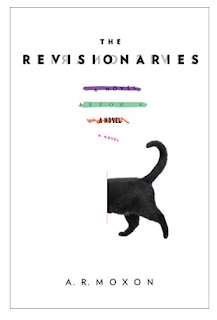 My novel—THE REVISIONARIES—released on December 3, 2019.
My novel—THE REVISIONARIES—released on December 3, 2019. It is now available for order!

Google Books
Amazon
Barnes & Noble
Books-a-Million
IndieBound
Penguin Random House Canada
Any of those links will get the job done, but I confess a love for the independent option. You also should be able to go to your local bookstore and place your order through them, and maybe buy more books while you're there, which will make your life better and keep independent bookstores going. The indie bookstore ecology is hugely important to the health of the industry, and your order there helps me just as much. Food for thought!
If you want to support an author—if you like what they do, if you'd like them to go on getting a chance to write things—the way you do that is simple: you order. It's how the publishing industry decides whether a debut novelist (such as ahem me) gets another bite at the biscuit.
Read the reviews!
"... equally audacious and brilliant ..."—Ron Charles, The Washington Post
"Father Julius jumps off the page. And he's not the only one ..."—Sergio De La Pava, The New York Times
"I'm almost irritated by how much I enjoyed it."-Amal El Mohtar, NPR
"Moxon's astounding novel, bursting at the seams with ideas and pathos, is a breathless demonstration of masterful storytelling."—Alexander Moran, Booklist
Please order my book. Then—if you liked it and have time and want to give me a thrill—leave a review on Goodreads and/or Amazon and let me know you did.
Get one for you.
Get one as a gift.
Get an office copy.
Let your friends and family know about it. Tell strangers on the street. Tell everybody! Read it with the cover ostentatiously displayed. Write it across the sky in gossamer teardrops! Proclaim it to the heavens in angelic tongues of fire!
Whatever you're able to do, know that I will appreciate you with my whole heart, and love you with my whole brain, and maybe if we meet up somewhere (on book tour, which I've been sent on because of all the orders, of course) I'll sign your copy with my whole hand, if that's what you'd like.
I can't wait for you to read this book.
And the next one.
November 16, 2019
The Mountain
-Mary Oliver
Here’s how it always seemed to me, ever since I was very young:
There was a mountain in the distance, which we could all see. And the authors were up there, climbing, climbing.They wrote books.I loved books.So I wanted to be on the mountain, too.
And I'd write stories in pencil
Sometimes I'd staple the pages together
If the stories were two pages long
This was entertaining, but it didn't seem to be the mountain.
I could still see the mountain, and the authors climbing it.
Authors.
Some of them were way up high. Some of them further down.Sometimes a cloud would break apart and there’d be another one I’d never noticed before.Authors.How they got on the mountain I didn’t know.Except…
…I knew it involved writing a book.Then something happened.Then they were on the mountain.What was this something?
Did they clutch their new pages in their arms,Take a running start, Leap, Fly through the air, Land as high as they could?If so, I knew I would never make the mountainImpossible to jump that high. Impossible.
But, if not jumping, then … what?I had written stories before, and I wasn’t on the mountain.What did one do?
Came the day I realized I had a story to tell, based on a story I’d made with my friend BenI thought about writing it, but … look how high the mountain is. I can’t jump up there.I’ll have to walk instead.
Page after page
I started walking toward the mountain. It wasn’t an easy walk for a while. I stumbled a lot. I got tired quickly.But other times the walk was pleasant.I walked on.
Every once in I’d look up and the mountain wouldn’t seem any closer.
Nor did its face seem any more climbable.But then I’d look back and see how far I’d come.And I was stumbling less. I was getting tired less.So, because the walking was pleasant, I walked on.
Came the day the trail ended. That is to say: I’d finished the story. I’d done all the writing I could.
So I read what I’d written.
Ow. Cramps.
Parts were pretty good.A few parts I liked a lot.A lot of it was quite bad. It was going to need to be worked on.There was a thicket between me and the mountain.I walked into it.
This wasn’t fun at all. It was hot sticky work. There were brambles. I couldn’t even see the mountain most days.Some days I was certain I wasn’t even walking toward it anymore.I learned how to use a hatchet.I went through the story over and over.The thicket thinned.
Came the day I finally reached the end of the thicket. That is to say: I’d made the story as good as I knew how.I’d arrived at a pile of enormous boulders.They didn’t seem climbable. But when I tried, I discovered my arms and legs were stronger than I’d imagined.
After a lot of false starts and scrapes and falls, I was atop the boulder. A realization: I was at the mountain.
I was at the mountain.I’d made it.I looked up, and despaired.
Immediately above was an outcropping, jutting out, seamlessly smooth, obscuring my view of the rest of the peak.There was no way up. It was impossible to climb.
Impossible.
But then I climbed it.It took a couple years, and a few times I thought I’d fall to my death, but I climbed it.
*How* did I climb it?With the help of other people.More people than I could say.I am very lucky, and very grateful.
Other authors who laid the paths long ago
A friend who helped chart the direction
A publisher who invited to pull me up.
An agent who gave me equipment I never could have gotten on my own.An editor who led me back into the brambles, handed me a hatchet, showed me a more likely path than straight over
So many of you, letting all of them know I was there in the first place.And the people around me who saw me start to walk in the first place, and encouraged me.
Turns out if you walk to the mountain, you’ll get to the mountain, and once you're there, you can climb it.
Turns out if you climb it, you’ll be on it
And if you arrive at an unclimbable spot, you can go back into the thicket as long as you want, until you find a more likely spot.
The mountain is patient.
And here’s what happened today:
I’m on the mountain now, thanks to more people than I can say.Not so high up. That’s fine.Maybe this is as high up as I ever get. That’s fine.There’s no bad spot on the mountain, any more than there's a bad path to it.
There are plenty on the mountain who aren’t traditionally published.And some who really did seem to fly up there.But nobody got up on the mountain without help.I sure didn’t.
I believe I'll keep climbing.
I have no idea how far up I can climb, nor does it particularly matter.But my arms feel rested, and my legs feel strong. And it’s good to climb.I do believe I’ll try to find out how far I can go.
There’s more people up here with me than I can say. There’s room for billions more.To be on the mountain you go to the mountain, and you climb.
Turns out going to the mountain was only ever about the walkingTurns out getting on the mountain was only ever about the climbing.And it turns out being on the mountain isn't about being seen.
It's about the view.
March 18, 2019
THE REVISIONARIES - Presales Now Open!
 My novel—THE REVISIONARIES—will come out on December 3, 2019. It is now available for preorder (preordering is very important and you should do it if you can please).
My novel—THE REVISIONARIES—will come out on December 3, 2019. It is now available for preorder (preordering is very important and you should do it if you can please). 
Google Books
Amazon
Barnes & Noble
Books-a-Million
IndieBound
Penguin Random House Canada
Any of those links will get the job done, but I confess a love for the independent option. You also should be able to go to your local bookstore and place your preorder through them, and maybe buy more books while you're there, which will make your life better and keep independent bookstores going. The indie bookstore ecology is hugely important to the health of the industry, and your preorder there helps me just as much. Food for thought!
In case you didn't know, preorder is very important. If you want to support an author—if you like what they do, if you'd like them to go on getting a chance to write things—the way you do that is simple: you preorder. There's a very good Twitter thread here that explains why, but in short, it's how bookstores decide to shelve or not, and it's how publishers decide how much publicity to give, and how media decides whether to review a book and interview the author. Etc.
And it's how the publishing industry decides whether a debut novelist (such as ahem me) gets another bite at the biscuit.
So, my friends, and-I-beg-your-indulgence-for-this-but-not-really, I'm going to pitch my book the next six months, and I'm going to pitch hard.
Please preorder my book. Then—if you have time and want to give me a thrill—leave a comment and let me know you did.
Get one for you.
Get one as a gift.
Get an office copy.
Let your friends and family know about it. Tell strangers on the street. Tell everybody! Read it with the cover ostentatiously displayed. Write it across the sky in gossamer teardrops! Proclaim it to the heavens in angelic tongues of fire!
Ahem. Anyway, that's what I'll be doing.
Whatever you're able to do, know that I will appreciate you with my whole heart, and love you with my whole brain, and maybe if we meet up somewhere (on book tour, which I've been sent on because of all the preorders, of course) I'll sign your copy with my whole hand, if that's what you'd like.
I can't wait for you to read this book.
And the next one.
February 17, 2019
The Compass and the Navigation
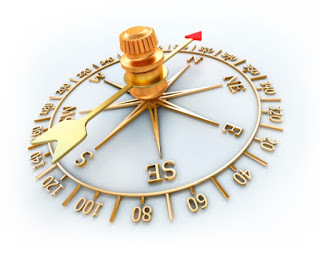 There’s a magic trick that’s going to get played on us every day during the 2020 election cycle. It’s a fairly simple trick, once you see it.
There’s a magic trick that’s going to get played on us every day during the 2020 election cycle. It’s a fairly simple trick, once you see it.I’d like to talk about what leadership is and what governance is.
I’d like to talk about the compass, the navigation, the travel, and the corrections.
Let me begin by proposing ‘movement’ as a metaphor for coordinated human activity.Sometimes the metaphor actually involves movement: Humanity moved from the earth to the moon.Sometimes the metaphor is figurative: The United States moved from legal slavery to abolition.
When people decide to leave the place they are and move to a different place, there’s an observable order to it.
The order is very important.
So, in movement, there is the moment of arrival at the destination.But before that moment, there is the actual trip.We began here. We moved until we got there. We put one foot in front of the other. We set sail and kept going until we arrived. The aircraft cut its way across the sky.The travel.
But before that, there was a plan. We are here. We will go there. Here, after study and research and consultation and testing and training, is how we’ll do it.The navigation.
But before that, there was a determination to move in the first place.We are here. We should be there. We will go there, in that direction, as opposed to all other directions.The compass.
Coordinated movement begins with a determination to move in one direction over all other directions.Then comes the plan.Then comes the actual trip.But the trip may turn out to be something quite different than the plan.
Sometimes the trip is smooth and easy, and goes exactly to plan.More often, especially if the destination is an ambitious one, or the path is long, there are challenges and setbacks and unforeseen difficulties.The route went off-plan, requiring delays and divergences and detours.Corrections.
We thought we would be here. But we are still going there.A successful correction requires the same tools that motivated the original trip: the determination to arrive at the destination, then the plan to do it, then the actual travel.In that order.
The compass determines direction.The navigation determines the route.The route leads to the destination.In that order. The order is key.
As long as you’re determined to end at your destination, and know the direction, and have the ability to chart your course, and the ability to actually move from one place to another, your original plan can absorb any number of corrections.You may even learn of a better destination on the way.But first you have to actually decide to move.
You wouldn’t make a plan before you knew where you were going.You wouldn’t begin travel before you’d figured out how to get there.It wouldn’t work.So now let’s talk about leadership and governance, and the magic trick that gets played on us over the difference.
Say we humans have a problem. It could be anything. Like 50% of the wealth in the hands of a few hundred people among billions.Or a medical system that only cares for those who can pay.Or millions of people without homes in the world’s richest country.It could be anything.
But I don’t want to be controversial, so let me make up a more sci-fi premise.Let’s pretend there was a climate disaster that threatens extinction of life on the planet. Say the evidence was incontrovertible.Say the early effects were present and observable.Try to imagine this.
Now, let’s say the remedies were known, but very challenging.Let’s say they would require a major restructuring of the political and economic and social order, globally.And let’s say as a result, there were a lot of people who didn’t want to do it.Again, try to imagine.
Let’s pretend that the people most resistant to changing the world order were the people who had gained the most power and wealth within that world order.Let’s pretend the next election would actually be about whether or not to even respond to the threat.Again, try to imagine.
Let me locate us in this scenario.We’re not yet at the point to start enacting a plan we haven’t yet decided to make.We’re not at the point to argue about the specifics of the plan—though we need a plan!What we need is the determination to move. We need the compass.
Leadership is the compass. Leadership is the thing that says, “even though it is controversial, even though it is disruptive, even though it is hard, we are going to move from here to there.”Leadership statements are compass statements.
Once we’ve determined we are going to move in a direction, we will need a plan, and a good one.The nuts and bolts of how it’s going to happen—the navigation.The actual logistics of doing it—the travel.That’s governance. It’s very important.It doesn’t come first.
“The Green New Deal” is a leadership statement. It’s a compass statement. It’s a declaration about coordinated human movement.You might disagree with this statement. If so, you have some options regarding how you might respond.
You might claim that there is no reason to move. You’d say something like, “this is a hoax.”You might claim that it’s too early to move. You’d say, “the science is uncertain.”You might claim it’s too late to move. You’d say, “human activity isn’t causing it.”Those are the direct responses.But remember there’s a magic trick.
Some might realize that the danger is real, and the moral call of movement is absolutely uncontestable. They might decide the best way to oppose is to perform some slight-of-hand.They’d say things like “The Green New Deal is unrealistic.”
Realistic?
That’s a matter for navigation. We’re not there.We’re making compass statements.
“The Green New Deal is unrealistic *sounds* like a governance statement.It’s not. It’s a leadership statement. It’s a compass statement.It says “actually, we will stay where we are” just as much as “climate change is a hoax” does.It says it with more subtlety, but it still says it.
I want to be careful, because even as we talk compass, we want an eye on navigation. It’s OK to point out that the navigation is off.But when one does so to close off or delay questions of coordinated movement, then it’s the magic trick. Leadership disguised as governance. A compass statement disguised as navigation.
If one wants to critique The Green New Deal’s policy, it needs to be within the larger context of a firm commitment to a robust and prioritized response to climate change, and a willingness to engage in the significant disruption that will cause. Otherwise it’s just using the challenge of the problem as a reason not to start.Abracadabra!
It’s one of the slyest tricks of opposition there is, to deny a clearly needed solution to an obvious problem, not because the need for a solution is great, but because the route hasn’t been charted thoroughly enough, because all of the potential problems haven’t been identified, because every last correction hasn’t been made.
But leadership comes BEFORE governance.
The compass determines the direction.The direction determines the navigation.The navigation determines the travel.And corrections can be made on the way.
This is the reason that Alexandria Ocasio-Cortez (for example) has so many people who oppose her obsessed and frightened, by the way.
Whenever someone arrives who actually makes bold and needed compass statements, people respond.
And, it reveals all the people who have been refusing to make them.
She’s showing us the magic trick.
Once you know the trick, you can see it everywhere.
Who’s going to PAY for Medicare for All?Magic trick. “Medicare for All” is a compass statement. We WILL care for everybody’s medical needs, because that is what a civilized society does.
The country won’t accept gun control, it can’t happen here.Magic trick. We WILL minimize gun violence. Letting our schools become war zones is unacceptable.
A 70% marginal tax rate is socialism run amok!Magic trick. We ARE going to address the scourge of wealth disparity, hording and corrupt billionaire welfare.
The Green New Deal is flawed!Magic trick. We ARE going to drop literally everything else to address a potential extinction-level crisis, because of course we are, my god, what the hell is wrong with you?
This is going to matter in 2020. Remember that leadership is the compass, governance is the navigation. Both are important, but one comes ahead of the other, and you can make adjustments on the way.
And watch everyone’s hands closely.

December 16, 2018
The Castle On The Hill
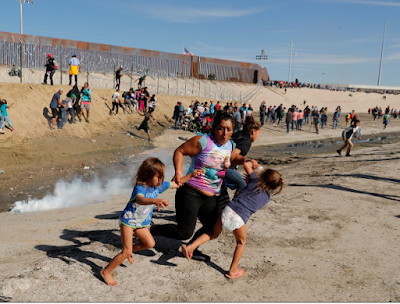
When you fell asleep, the castle on the hill was firing their customary rockets down onto the villages in celebration of the king; when you woke, your village was already in flames.There was no time to save anything, except your only child.__There hadn’t been much food in the village. The castle atop the hill gathered most of the food for itself. Your uncle had found his way into the castle atop the hill; he wrote of the mountains of food to be found there.“I’m hungry,” said your only child.You began to climb.__You brought your child along. Your only child: hungry.The castle guards had been given telescopes, and saw you coming from a distance. They raised the alarm.The people in the castle shook with outrage. We’re being invaded, they fretted. We’re being invaded for our food.__The king ordered the drawbridge raised. He put archers on the parapets. “DON’T CLIMB” he bellowed.You were still at the bottom of the hill, in the next village up.“I’m thirsty,” your child said.The castle puts our water in bottles, the villagers said.You climbed.__DON’T CLIMB the king bellowed.You barely heard. You thought of mountains of food. You thought of rooms full of water.You climbed. You brought your child with you, your only child: hungry, thirsty.An invasion is coming, the people in the castle moaned, a great invasion.__When you reached a higher village, you saw the easy paths had been barricaded. Only the harder paths remained.“I’m sick,” your only child said.The castle has the best medicine, the villagers said.You took the harder path. You brought your only child: hungry, thirsty, sick__ITS AN INVASION, bellowed the king.It's an invasion, the people mourned, from their baths in the castle atop the hill. They worried as they gathered their excess food in sacks for disposal.A great invasion for our food and water and medicine, which is the greatest.__When you reached the castle wall, well-fed guards seized you.They seized your child, sick, hungry, thirsty.Whose child is this, asked the guards.Mine, you replied.Where is your proof, asked the guards.It burned, you said. It burned, it all burned.__They took your child away, hungry, thirsty, sickWhen you saw her next, she had diedShe had died in a cage: unfed, thirsty, sick__The people in the castle heard of thisYes it's a tragedy, they said. A tragedy, that this woman chose to bring her child on the journey to the top of the hillSuch a dangerous tripWhy would she put her child in such dangerJust to invade usJust to invadeHow selfish__Why didn’t she stay in her own villageWhy didn’t she take the easier pathWhy did she come when she knew the path was hardYou tried to tell them why, but they couldn't hear a wordThey were firing their customary rockets into the villages to celebrate the king



